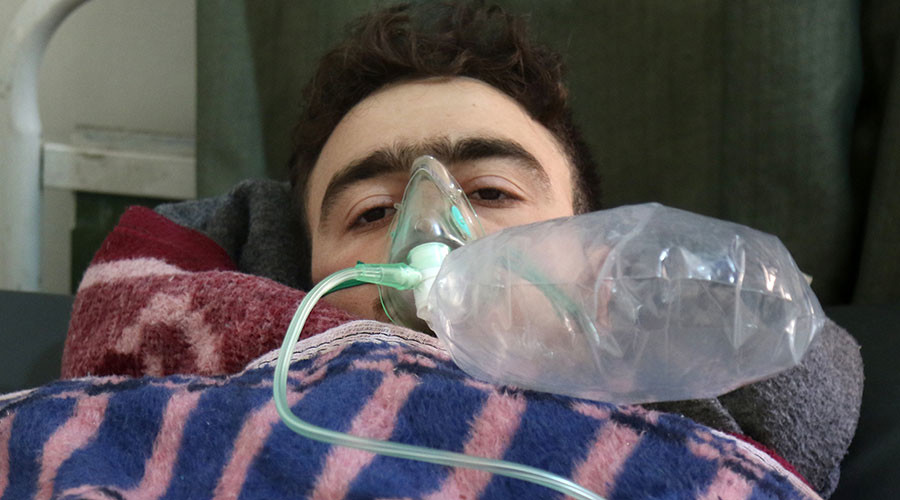UN commission on Syria not ruling out various sources of ‘chemical agent release’ in Idlib

The UN commission investigating allegations of war crimes and crimes against humanity in Syria says it cannot yet say for certainty what the source of the gas allegedly used in Idlib really was. The body says the release of gas coincided with airstrikes in the area.
Citing eyewitnesses, experts and studied data, the UN Independent International Commission of Inquiry on the Syrian Arab Republic said on Friday that “nerve gas” was released in the Syrian town of Khan Sheikhoun in April.
“Between 6:40 and 7:00am on April 4, a series of airstrikes [hit] the town of Khan Shaykhun. This is a consensus. These airstrikes coincided with the release of a chemical agent, likely sarin or a sarin-like [substance],” the commission’s chair, Paulo Sergio Pinheiro, told journalists during a Friday press briefing. Pinheiro was presenting preliminary results of the investigation in the chemical incident at a closed UN Security Council meeting.
However, the commission has neither been able to confirm who exactly was behind the alleged chemical attack, nor “what Air Forces were able to do that” as regards to the airstrikes.
However, the commission has neither been able to confirm who exactly was behind the alleged chemical attack, nor “what Air Forces were able to do that” as regards to the airstrikes.
“We are not in a position to reach a conclusion,” Pinheiro said. “The commission still has not ruled out any version concerning the causes of the release of this nerve agent and continues to follow different leads.”
Pinheiro admitted that the commission has not conducted any investigation on the ground, instead relying on information shared by “several countries,” sources in the rebel-held Syrian town as well as photographic and video evidence.
Pinheiro admitted that the commission has not conducted any investigation on the ground, instead relying on information shared by “several countries,” sources in the rebel-held Syrian town as well as photographic and video evidence.
“We are conducting interview with eyewitnesses, medical professors, military, chemical weapons experts while simultaneously collecting and analyzing photos, videos, satellite imagery and other materials checking all of them for credibility and reliability,” Pinheiro said. “We also asked several countries to share their reports about the incident.”
As many as 100 people were allegedly killed and several hundred injured in the April 4 incident. The US has squarely laid the blame on Damascus, claiming that it hid chemical weapons stockpiles from the OPCW after pledging to hand them over in 2013. The presumption has been supported by US allies in Europe and the Middle East.
As many as 100 people were allegedly killed and several hundred injured in the April 4 incident. The US has squarely laid the blame on Damascus, claiming that it hid chemical weapons stockpiles from the OPCW after pledging to hand them over in 2013. The presumption has been supported by US allies in Europe and the Middle East.
Moscow, however, said a thorough investigation, including an on-site inspection in rebel-held territory, should be carried out before any conclusions are reached.
However, the executive council of the Organization for the Prohibition of Chemical Weapons (OPCW) overwhelmingly rejected a proposal from Russia and Iran to examine the site of the chemical incident in Idlib province, provoking an angry diplomatic response from Moscow.
In the meantime, the UK and France claim their experts have received samples from the site of the incident. On Thursday, the OPCW Director-General Ahmet Uzumcu also said that four OPCW designated laboratories have studied samples collected from three victims of the alleged attack during their autopsy and seven individuals undergoing treatment after surviving the incident.
The Russian military, however, questioned the swift analysis of the samples, adding that it wanted details on who collected the samples and how they were studied at OPCW designated labs, which has not been disclosed.
In the meantime, the UK and France claim their experts have received samples from the site of the incident. On Thursday, the OPCW Director-General Ahmet Uzumcu also said that four OPCW designated laboratories have studied samples collected from three victims of the alleged attack during their autopsy and seven individuals undergoing treatment after surviving the incident.
The Russian military, however, questioned the swift analysis of the samples, adding that it wanted details on who collected the samples and how they were studied at OPCW designated labs, which has not been disclosed.
Russian Foreign Minister Sergey Lavrov said on Friday that the fact that Russia’s proposal of on-site investigation was “blocked by Western delegations without any explanations” exposes their aim to topple the Syrian President Bashar Assad. Lavrov said that it was now “obvious” that “false information” was being used to escalate the war in Syria into a full-scale invasion.
Russia has been warning that the incident may have been a false flag operation meant to provoke a US attack against Syrian government forces. Following the April 4 incident, the Russian Defense Ministry issued a statement saying that the Syrian Air Force was targeting a militant arms depot that is believed to have contained some chemicals used in the production of gas-filled shells previously used by rebels against government forces in places like Aleppo





0 Comments:
Post a Comment
Subscribe to Post Comments [Atom]
<< Home